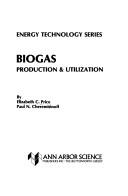| Listing 1 - 10 of 355 | << page >> |
Sort by
|
Book
ISBN: 9780443184796 0443184798 044318478X 9780443184789 Year: 2024 Publisher: Cambridge, MA : Woodhead Publishing,
Abstract | Keywords | Export | Availability | Bookmark
 Loading...
Loading...Choose an application
- Reference Manager
- EndNote
- RefWorks (Direct export to RefWorks)
Biogas to Biomethane: Engineering, Production, Sustainability addresses the technical, social and economic aspects of biogas upgradation to biomethane. With a focus on the latest advances, the book examines the challenges of biomethane production from technology to safety. Sections discuss the fundamentals of biomethane production, examine the latest technologies for biogas upgradation, provide step-by-step guidance on how to calculate and model mass, energy and emission flows from different process and technological configurations, address alternative and combined approaches to biogas upgradation, such as with mesophilic and thermophilic bacteria, consider the socio-economic implications of the biogas to biomethane production chain, and more.

ISBN: 9780250403349 025040334X Year: 1981 Publisher: Ann Arbor: Ann Arbor science,
Abstract | Keywords | Export | Availability | Bookmark
 Loading...
Loading...Choose an application
- Reference Manager
- EndNote
- RefWorks (Direct export to RefWorks)
Book
Year: 2023 Publisher: [Place of publication not identified] : KIT Scientific Publishing,
Abstract | Keywords | Export | Availability | Bookmark
 Loading...
Loading...Choose an application
- Reference Manager
- EndNote
- RefWorks (Direct export to RefWorks)
Book
Year: 2010 Publisher: Copenhagen, Denmark : Nordic Council of Ministers,
Abstract | Keywords | Export | Availability | Bookmark
 Loading...
Loading...Choose an application
- Reference Manager
- EndNote
- RefWorks (Direct export to RefWorks)
Book
Year: 2020 Publisher: London : IntechOpen,
Abstract | Keywords | Export | Availability | Bookmark
 Loading...
Loading...Choose an application
- Reference Manager
- EndNote
- RefWorks (Direct export to RefWorks)
The interest in biofuel production and application is governed by the depletion of fossil fuel resources and the threatening pollution of the atmosphere because of the extensive emissions of greenhouse gases, which the present global vegetation cannot cope with. A remedy against the greenhouse gas emissions is the use of biomass presently grown as a source for biofuels. Biofuels can be further utilized as substrates for bulk chemical products. This approach is known as the biorefinery concept as an analogue to the oil-based refineries.The present book offers some examples and new ideas for the broader applications of biofuels and the resulting raw materials for energy and chemical products as alternatives to the traditional fossil fuels.
Book
Year: 2021 Publisher: London, England : IntechOpen,
Abstract | Keywords | Export | Availability | Bookmark
 Loading...
Loading...Choose an application
- Reference Manager
- EndNote
- RefWorks (Direct export to RefWorks)
Anaerobic digestion (AD) is by far the most important technology for providing clean renewable energy to millions in rural areas of many developing countries. AD of biowastes produces both biomethane and anaerobic digestate as a byproduct that can be used further as a biofertilizer. Biowastes including sewage, food processing wastes, animal wastes, and lignocellulosic wastes typically produce biogas containing 55%-70% biomethane. In the context of energy consumption, more than 85% of the total energy consumed currently comes from non-renewable fossil resources. Biogas technology can provide sustainable, affordable, and eco-friendly energy through waste recycling. This book provides basic knowledge and recent research on biogas production, focusing on the enhancement of biomethane and production routes integrated with microalgae cultivation or agriculture.
Book
ISBN: 1774074265 9781774074268 Year: 2020 Publisher: Oakville, ON
Abstract | Keywords | Export | Availability | Bookmark
 Loading...
Loading...Choose an application
- Reference Manager
- EndNote
- RefWorks (Direct export to RefWorks)
Book
ISBN: 9251031266 Year: 1992 Publisher: Rome FAO
Abstract | Keywords | Export | Availability | Bookmark
 Loading...
Loading...Choose an application
- Reference Manager
- EndNote
- RefWorks (Direct export to RefWorks)
Book
Year: 2020 Publisher: London : IntechOpen,
Abstract | Keywords | Export | Availability | Bookmark
 Loading...
Loading...Choose an application
- Reference Manager
- EndNote
- RefWorks (Direct export to RefWorks)
The interest in biofuel production and application is governed by the depletion of fossil fuel resources and the threatening pollution of the atmosphere because of the extensive emissions of greenhouse gases, which the present global vegetation cannot cope with. A remedy against the greenhouse gas emissions is the use of biomass presently grown as a source for biofuels. Biofuels can be further utilized as substrates for bulk chemical products. This approach is known as the biorefinery concept as an analogue to the oil-based refineries.The present book offers some examples and new ideas for the broader applications of biofuels and the resulting raw materials for energy and chemical products as alternatives to the traditional fossil fuels.

ISBN: 1851661026 Year: 1988 Publisher: London Elsevier Applied Science
Abstract | Keywords | Export | Availability | Bookmark
 Loading...
Loading...Choose an application
- Reference Manager
- EndNote
- RefWorks (Direct export to RefWorks)
| Listing 1 - 10 of 355 | << page >> |
Sort by
|

 Search
Search Feedback
Feedback About UniCat
About UniCat  Help
Help News
News